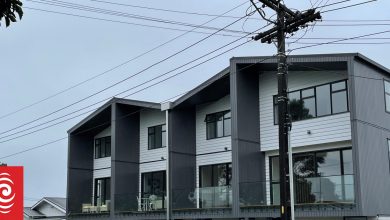Rents dropping, housing stock on the rise: What is happening with the NZ housing market this week?

Analysis – Rents are dropping as more houses become available. But how soon before changes to the bright-line test in July impact the market? Here’s what moved real estate this week.
High interest rates are the biggest drag on the housing market, with an increase in listings but prices flattening out again.
The CoreLogic NZ Housing Chart Pack showed a 9.2 percent annual increase in sales activity in May was still significantly below normal sales volumes, giving buyers plenty of choice and room to negotiate down prices.
Still, fewer deals were being made with total stock for sale 16 percent up on the same time last year and nearly 28 percent above the five-year average.
The market would remain under pressure until interest rates come down, CoreLogic NZ chief property economist Kelvin Davidson said.
First-home buyers continued to represent 25 percent of purchases helped with lower prices, less competition, a KiwiSaver for the deposit, as well as access to low-deposit finance at the banks.
Relocating owner-occupiers, with a 26 percent share of purchases, were starting to show signs of a small comeback.
The Real Estate Institute House Price Index for May indicated the value of the housing market rose 2.3 percent last month.
However, the national median sale price fell slightly by 1.3 percent on the year earlier to $770,000 from $780,000.
Still, 10 out of 16 regions saw price increases with West Coast leading the way with a 14 percent increase to $405,000.
The total number of sales rose last month, reflecting an increase in stock levels and new listings, REINZ chief executive Jen Baird said.
The national number of listings rose on the year earlier, with notable increases in Wellington (+103 percent), Hawke’s Bay (+34 percent), Marlborough (+33 percent), Auckland (+30 percent), Otago (+31 percent) and Waikato (+21 percent).
“It might be a few months yet before the residual impact of readjustments post the government’s 100-day plan and budget are felt. Indeed, there are cool economic breezes being felt but there are signs of more positive activity ahead,” Baird said.
Granny flats
In a move to add to the housing stock, Housing Minister Chris Bishop announced plans to remove the need for building consents for houses up to 60 square metres.
While councils won’t be consenting the build, people will still have to notify them so the house can be added to the LIM report.
Backyard granny flats will need to comply with the building code, and there will be a range of requirements such as smoke alarms and weather tightness.
One concern is councils providing adequate infrastructure, like water, if it is not monitoring what is being built.
Consultation is open until 5pm on 12 August. Final policy decisions will be made later in 2024, and expected to be in place by mid-2025.
Rents dropping
It has been harder to rent out homes after a significant increase in rental stock in the past quarter.
Data from realestate.co.nz showed that while rentals had increased by 40 percent nationally over the last quarter, the number of rental seekers had increased by just 2.5 percent.
The website’s data shows the stock for the same period is up by 40 percent for Auckland, 56 percent for Wellington, and 35 percent for Canterbury.
Landlords needed to be realistic with expectations if they want their properties rented out, Auckland Ray White property manager Shane Ryder told RNZ reporter Lucy Xia.
“We’ve actually already introduced some properties where we’ve reduced the rent already to meet the market, we’ve already done that on a number of properties over the last month,” he said.
But changes to the bright-line test starting in July would impact sales, which would affect the rental supply, realestate.co.nz spokesperson Vanessa Williams said.
Trade Me data showed the national median rent in April 2024 remained at $650 a week, unchanged from March.
Meanwhile, an OECD report released in April said that New Zealand was among the most expensive places to rent in the world, on a number of measures.
The country was one of only eight in which median housing costs used up more than 40 percent of disposable income for the lowest-income tenants.
“Rent growth might slow but rental affordability doesn’t look like it’s going to improve in the near term … renting is going to remain pretty expensive. It’s not easy whether you’re paying a mortgage or paying rent. This is definitely not a cheap country to rent. It’s not a cheap country to do much actually,” CoreLogic’s Davidson told RNZ money correspondent Susan Edmunds.
Rate cuts, GDP, inflation and consumer confidence
Households continued to face strong financial headwinds and consumer confidence fell in June.
The Westpac McDermott Miller Confidence Index fell 11 points to 82.2 – wiping the gains over the past six months.
A confidence level below 100 signals households were pessimistic about the economic landscape.
Households were doing it tough as inflation held up, Westpac senior economist Satish Ranchhod said.
“Ongoing high borrowing costs, combined with a more uncertain labour market is undermining consumer confidence.”
Any relief by way of a Reserve Bank rate cut was not on the horizon, Ranchhod said.
Reserve Bank chief economist Paul Conway said a tight labour market and material shortages were key to New Zealand’s high inflation.
Good progress was being made in bringing inflation back to the RBNZ’s 1 to 3 percent target, but the road to its 2 percent mid-point could happen faster or slower, he said.
Conway said spare capacity was starting to emerge in the economy and would help slow down domestic price pressures, with inflation expectations likely to fall.
New figures showed New Zealand was no longer in recession, with 0.2 percent growth in the three months ended March, and 0.3 percent annually.
But economists were unexcited by the data.
The Reserve Bank’s high interest rates policy to get inflation under control had been the chief cause of the economic downturn and recessionary period, ASB senior economist Kim Mundy told RNZ business editor Gyles Beckford.
RBNZ interest rate cuts would be needed to help lift the economy, but Mundy did not think that would happen while stubborn inflation persisted.
And Finance Minister Nicola Willis said the government “has a plan to turn things around”.
“We are forecasting in our recent budget for inflation to come under control, [for] interest rates to drop and growth to recover. It’s a long slog we are in.
“Our message to New Zealanders is: hang on, better times ahead.”
According to the news on Radio New Zealand




